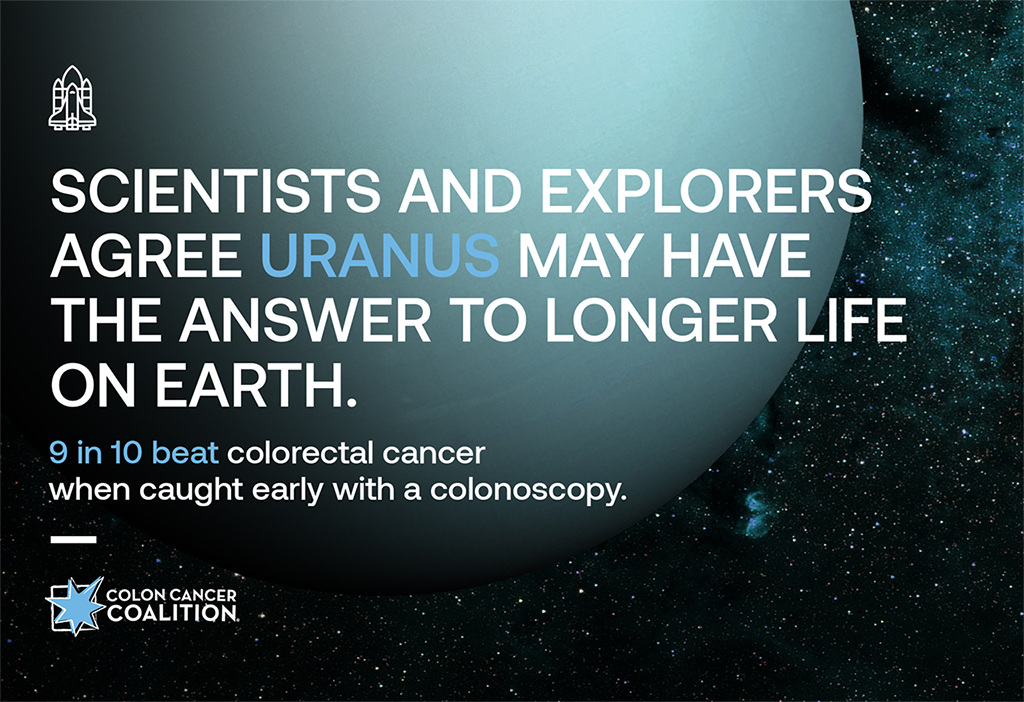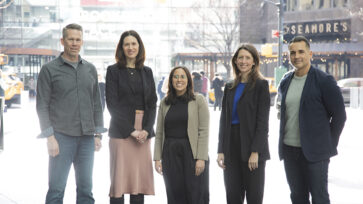A joke about Uranus has been a grade-school mainstay for decades. Now it’s the central hook in a clever campaign designed to promote awareness of colorectal cancer.
The Colon Cancer Coalition kicked off Colorectal Cancer Awareness Month last week by debuting “Mission to Uranus,” billing it as a space race that could save your life. The effort is designed to alert a range of audiences to some sobering numbers: An estimated 150,000 people will be diagnosed with colon cancer in the United States this year and more than 50,000 people will likely die, even though nine out of 10 colon cancer patients can survive with early screening and detection.
“We are trying to reach people that aren’t within the colorectal cancer community to talk to them about the importance of screening and knowing the signs and symptoms of colon cancer,” said Erin Peterson, senior director of mission and partnerships at the Colon Cancer Coalition. “We are all about creative ways to do that – to reach outside the colon cancer echo chamber of patients, survivors and organizations that continuously talk to each other.”
Flor Leibaschoff, CCO at BeautifulBeast, the agency responsible for the campaign, agreed, adding: “We thought the way to talk about the elephant in the room is to laugh about it. The way to encourage conversation in social groups is with love and levity. This shouldn’t be shameful.”

Reaching younger potential patients, long among the Coalition’s biggest challenges, ranks among the primary goals of “Mission to Uranus.” Even as the recommended age for regularly scheduled colonoscopies has been lowered from 50 to 45, more than half of Americans aged 50 to 54 have not been screened.
“We want to reach people who aren’t of screening age yet, so that when they do reach 45 they already know about the importance of screening,” Peterson said.
To lead this new mission – on social media and in radio and out-of-home advertisements – the coalition turned to astronaut Dick Covey, who traveled into space on four different missions.
“We lost our youngest daughter to colon cancer when she was just 33,” he said. “As we were looking for ways to keep her in our memory and do something meaningful, we got involved with the Colon Cancer Coalition to help with the first ‘Get Your Rear in Gear’ race in New York City.”
Covey was thus a natural choice to play a large role in ‘Mission to Uranus.’
“Having someone like Dick be part of the Coalition and the ‘Mission to Uranus’ provides not only the human aspect with his family history, but also the authority behind the campaign,” Peterson said. “He gives a little panache to it, plus he is a great human being in general.”
“Erin and others were well aware of my background. So when Mission to Uranus came up, they thought, ‘Maybe the spaceman can help us here,’” Covey recalled, pointing to the “great stigma” of talking about natural body functions.
“Culturally, we don’t talk about the functions of urination and defecation. And yet as an astronaut, when I talk to people – kids or adults – a question I know I will be asked is, ‘How do you go to the bathroom in space?’ The only way to address that is with levity.”
Indeed, Covey believes the key to all such awareness efforts is putting people at ease.
“Once people are laughing, they are open to considering information they may not otherwise,” he continued. Among the information that the Coalition wants audiences to reconsider are erroneous preconceptions about colonoscopy preparation and anesthesia.
In the weeks ahead, look for “Mission to Uranus” to unfold on a number of different fronts.
“We are trying to tell a story and our biggest platform is Twitter and social media, but we also have billboards that are very straightforward: ‘Get a colonoscopy and extend life on earth,’” Leibaschoff said. “We also have radio spots that recount the history of past space missions and explain that the next is the most important one yet: The ‘Mission to Uranus’ could save humankind.”







